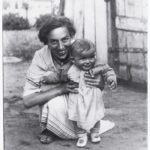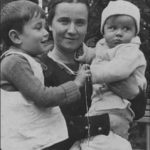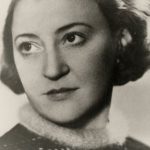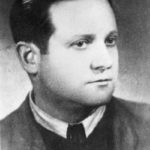It was Friday, August 22, 1942. We have been living in terrible tension for the last few weeks. The expulsion of the Jews (600,000) in Warsaw continues. There are constant trains with people from Radom, Kielce and other [cities] being deported to the Treblinka death camp. We know that the same thing awaits us, but we delude ourselves.
“On August 10, there was a blockade. Two Jewish policemen came and broke the door. In the locker was my wife and children, mother, brother-in-law, sister-in-law with three children – a total of 12 people. They took us all to the Umschlagplatz, it was 11 o’clock in the morning. At six o’clock [in the evening] they gathered us and drove us to the wagons under the hail of whips.”
My father, Kalman Babic, 48 years old, was a foreman, a tinsmith. The material condition of the family was good, we lived on Leszno Street 105, in a four-room apartment with a telephone. We lived comfortably. We were seven children: three brothers and four sisters at home, and an eighth boy adopted from the orphans’ home. At home we spoke Yiddish and Polish.
My brothers, Ruwen Katz, age 23, and Wolf Katz, 26, were taken from Otwock to build a camp in Treblinka. In that time a young boy escaped from the Treblinka camp from the workplace to repair the railway track. And when during the evening assembly the Germans discovered the lack of one Jew, they ordered to deduct a tenth from the row and shoot them. My brothers were in this ten.
“Make proper use of your lives, at least you. For together with the lives of our dear ones so many unfulfilled hopes and actions disappeared in the graves, and we thought that we had time. Be happy.”
In September, 1942 they took us to Treblinka in a closed cattle wagon. They took my wife and children to a barrack to undress. We, the men, were ordered to undress on the square and the dogs would chase us to the gas. I have never seen my children and my wife.




